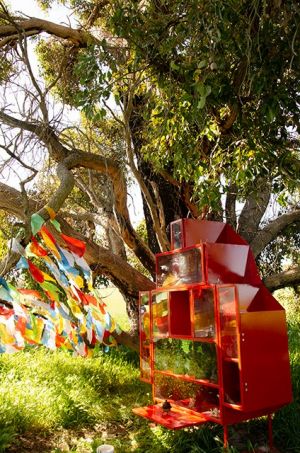A major affliction, one of the three poisons in Buddhism
“Among the various afflictions, only anger manifests itself in a very
crude manner, destroying the practitioner in a most effective way.
Therefore the ancients said: ‘When we allow an angry thought to arise, we open the door to millions of obstructions.’ For example,
while reciting the Buddha’s name, a practitioner may suddenly think
of a wicked, ungrateful, stern and evil person who has treated him
cruelly; or, he may remember close relatives who are troublesome and
unreliable and have caused him grief. He therefore becomes sad and
angry, fidgety and uneasy. In that state of mind, his mouth recites
the Buddha’s name while his mind is saddened and full of delusive
thoughts. Some practitioners drop their rosaries and stop reciting; lying down, they put their arms on their foreheads and let their minds wander aimlessly. Others are so afflicted and saddened that they forget about eating and sleeping in their desire to confront the culprit and shout at him; or they look for ways to take revenge and get even. The angry mind can harm the practitioner to that extent. To combat and subdue anger and resentment, we must develop a compassionate mind. The Lotus Sutra teaches: ‘We should take the mind of great compassion as our house, forbearance as our armor, the Truth of Emptiness as our throne.’ We should think: we ourselves and all other sentient beings are common mortals drowning in the sea of Birth and Death, all because of karma and afflictions. However, afflictions by their very nature are illusory and unreal. For example, where does an angry thought come from before it arises? Where does it return to
when it dissipates? When we are angry and resentful, we are the first to suffer, because we have ignited the fire of afflictions, which will consume us. Anger, moreover, can neither convert nor bring a single benefit to anyone. Is it not then a useless case of delusion? We should think further: those who have harmed us by their wrongful actions have, through delusion, planted evil seeds; they will necessarily suffer retribution. They should therefore be the objects of pity, not anger. This is because, if they were clear-minded and understood the causes of merit and retribution, they would never dare do such things. We are offspring of the Buddhas and should apply their teachings to dissolve our own afflictions – because the goal of cultivation is to seek
liberation and happiness, not to descend upon the path of suffering. We should feel compassionate and forgiving of injurious actions and practice forbearance, understanding that everything is illusory and void. We should remember the words of the ancient masters: ‘The fire of the three poisons, greed, anger and delusion, / Burns up all the forests of virtue /. Those who would tread the Bodhisattva Path, / Should be forbearing in mind and body.’ ”
Tam: 149-150
“Coming at the conclusion of the section devoted to the protection of Bodhicitta (Bodhi-Mind), patience is celebrated as the supreme austerity. It is the antidote to anger, regarded in Buddhism as the most destructive and perilous of all mental factors. Anger, defined as the flooding of the mind with violent and aggressive feelings, leading naturally to hostility and conflict, is outlawed in Buddhism as in no other religious tradition. Even so-called righteous anger, so often excused as having injustice and abuse as its object, is utterly condemned if this involves the overpowering of the mind in a wave of
uncontrollable and destructive passion. Aside from a purely external and as it were artificial indignation, put on for educational purposes – which has compassion as its motive and is acted out by one whose mind is under control – anger has absolutely no place in the scheme of spiritual development. It is totally inimical to mental training and will ruin and annihilate in an instant all progress and merit gained. This being so, the crucial question of how to behave in a hostile
environment begins to emerge. Step by step, patriarch Shantideva (q.v.) focuses on the real source of the problem, the basis of anger as of every other defilement. This is the ego, the self, the sense of ‘I,’
experienced as the center of the universe, and a universe interpreted as friend and enemy in relation to how it is perceived from the egocentric viewpoint. In Buddhism, this is of course the central issue, and it is only in the light of the full teachings on emptiness that it can be satisfactorily discussed.”
Buddha, who instructed him and converted him to Buddhism.”
Sokk: 12
“The life story of the Venerable Angulimala is one of the most moving accounts in the Buddhist canon. After killing ninety-nine persons, Angulimala was converted by the Buddha, repented his evil ways and joined the Order: One day as he went on his round for alms he saw a woman in labor. Moved by compassion, he reported this pathetic woman’s suffering to the Buddha who then advised him to
pronounce the following words of truth, which later became known as the Angulimala Paritta (Mantra)… ‘Sister, since my birth in the Arya clan [i,e., since my ordination], I know not that I consciously destroyed the life of any living being. By this truth may you be whole and may your child be whole.’ He went to the presence of the suffering sister and uttered these words. Instantly, she delivered the child with ease.” (Narada Maha Thera, The Buddha and His Teaching, p.124.)”
